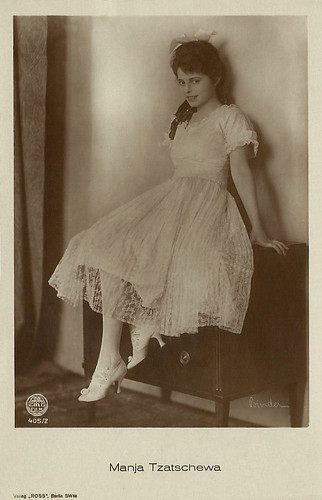
German postcard by Ross Verlag, Berlin, no. 296/2, 1919-1924. Photo: Becker & Maass.

German postcard by Ross Verlag, Berlin, no. 405/1, 1919-1924. Photo: Alex Binder / Eiko Film.
Temperamental Oriental young women
Manja Tzatschewa was was born Maria Trifonova Tsacheva in 1897 in Lovech, Bulgaria, in the family of the forester Trifon Tsachev and his wife Lala, born Kivalova. Soon after, the family moved to Peshtera and then Sofia, where Trifon Tsachev headed the forestry administration at the Bulgarian Ministry of Agriculture.
Manja completed her schooling and professional training in Switzerland, Paris, and Berlin. There she attended the acting school of the German theatre. Despite her youthful age, she is said to have been a Royal Bulgarian Court Actress by 1918.
In 1917, she made her film debut in the German silent film Die sterbenden Perlen/The Dying Pearls (Rudolf Meinert, 1917). Already in her second film, Die seltsame Geschichte des Baron Torelli/The strange story of Baron Torelli (Richard Oswald, 1918), she had the female lead.
Other major parts followed in Lupu Pick's sensational Mr. Wu (1918), and the Lev Tolstoy adaptation Der lebende Leichnam/The living corpse (Richard Oswald, Athur Wellin, 1918) starring Bernd Aldor. She also did many supporting parts. Often she performed temperamental Oriental young women: Indian, Japanese, Chinese, etc.
Tzatschewa was the wife of director Manfred Noa (1893-1930) and starred in most of his films from 1920-1921, such as Berlin W. (Manfred Noa, 1920) in which she had the lead as Tauentzien-Girl Dolly. She also acted in the serial Der Mann ohne Namen/Peter Voss, Thief of Millions (Georg Jacoby, 1921), starring Harry Liedtke, in which she was the favourite wife of Prince Abdul (Erich Kaiser-Titz), and in Der Schatten der Gaby Leed/The shadow of Gaby Leed (Carl Boese, 1921).

German postcard by Ross Verlag, Berlin, no. 296/1, 1919-1924. Photo: Becker & Maass.

German postcard by Ross Verlag, Berlin, no. 349/2, 1919-1924. Photo: Atelier Balazs / Eiko Film.
Conflated with her younger sister
After 1922, Manja Tzatschewa's productivity drastically slowed down: between 1924 and 1926 she did only four more films.
Her last performance was a supporting part in Erich Eriksen's comedy Annemarie und ihr Ulan/Annemarie and her Uhlan (1926), starring Colette Brettel and Sig Arno.
In 1926 Manja married the lawyer and insurance broker Carl Friedrich Schweitzer. She may have emigrated with him around 1934 because of his Jewish ancestry. Manja Tzatschewa probably died in France in 1966.
IMDb and many other respectable sources conflate Manja Tzatschewa with her younger sister Tzwetta, probably because both acted in German silent films.
Tzwetta Tzatschewa/Tzveta Tzacheva (1900-after 1928) also appeared in Germany in a handful of silent film productions, in particular F.W. Murnau's Marizza, genannt die Schmugglermadonna/Marizza, Called the Smugglers' Madonna (1921). Tzwetta was married to the actor Georg Alexander between 1924 and 1928.
Ivan Tzacheff, Manja's and Tzwetta's brother, worked, partly under the stage name Mario Parlo, as a tenor at the Essen Stadttheater and at the Semperoper in Dresden.

German postcard by Ross Verlag, Berlin, no. 405/2, 1919-1924. Photo: Alex Binder / Eiko Film. Collection: Didier Hanson.

German postcard by Ross Verlag, Berlin, no. 1617/1, 1927-1928. Photo: Becker & Maass, Berlin.
Sources: Wikipedia (English, German and Bulgarian) and IMDb.
No comments:
Post a Comment